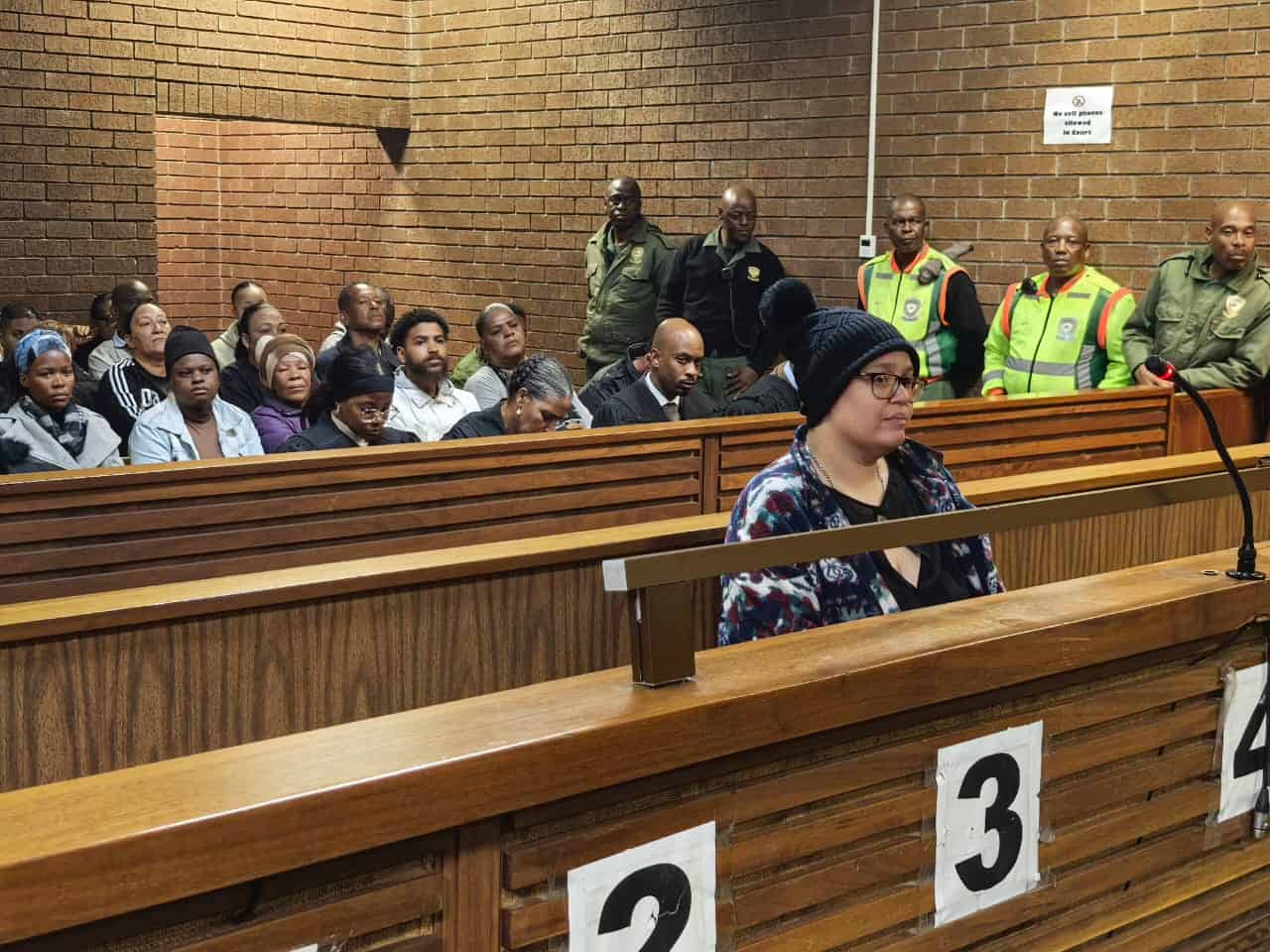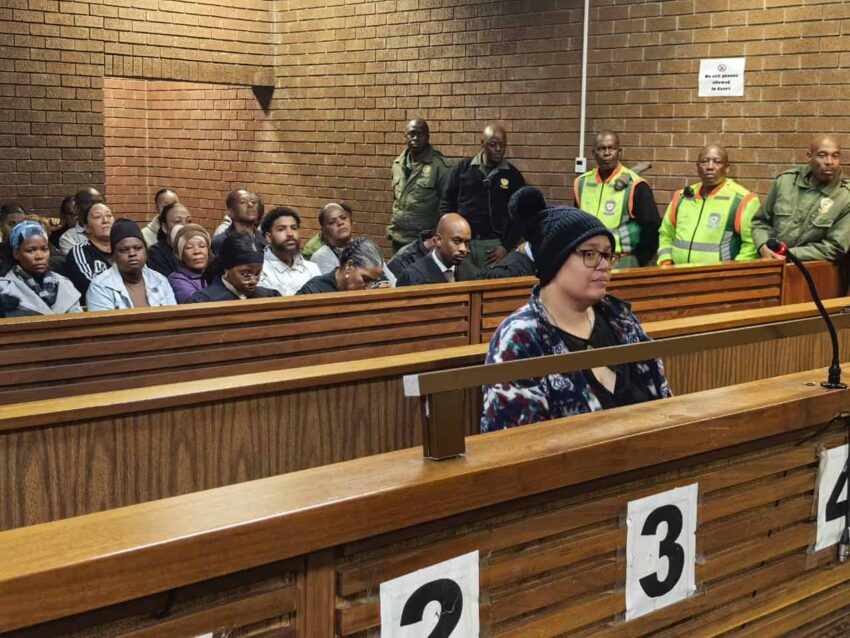
A senior detective told the Roodepoort Magistrate’s Court on Wednesday that Tiffany Meek would be safer in prison than in the community due to public outcry surrounding the case of her son Jayden-Lee’s death.
The investigating officer, Sergeant Nceba Diko, who has 20 years of police experience, testified during cross-examination that he would oppose any bail decision should the court grant it.
The bail hearing revealed conflicting accounts about the child’s disappearance on 13 May 2025, with contradictory witness statements about clothing and timeline discrepancies that have emerged during the investigation.
Alternative address rejected
Defence attorney Noven Naidoo questioned Diko about accommodation arrangements for Meek if bail were granted.
The detective confirmed that an alternative address had been provided by Meek, but said he received “an address outside Gauteng”.
When asked whether the defence was willing to supply an address in the Randburg area closer to the accused’s workplace, Diko denied this was the case.
The detective stated it was “only in this circumstance” that he believed “Meek would be safer in a prison cell than out in the community.”
Drawing on his experience with high-profile cases, Diko explained his approach.
“The cases I’ve dealt with when there have been public outcries, the accused would remain in jail until sentencing,” he said.
ALSO READ: State disputes framing claims in Jayden-Lee Meek case, warns mother could destroy evidence if freed
Tiffany Meek flight risk concerns
Naidoo reiterated that Meek had been aware of her suspect status since 30 May 2025, along with her immediate family members.
Despite this early awareness, the detective maintained concerns about flight risk.
When asked whether Meek was willing to hand herself over upon learning she was a suspect, Diko confirmed this was correct.
However, he defended the decision to issue a warrant of arrest.
“This law firm, Ureesh Dorasamy, I believe, has its policies. As the Saps [South African Police Service], we also have our own way of performing our duties,” Diko explained.
“When you came to us and told us how we are supposed to effect an arrest, we had to listen to you because we respected you, but we knew how we are supposed to execute our duties.”
ALSO READ: WATCH LIVE: Investigating officer cross-examined in Jayden-Lee Meek case
Prison safety debate
The cross-examination addressed safety concerns in both the prison and the community.
When Naidoo countered that prison was also unsafe for Meek, Diko responded firmly.
“I know prisons to be a safe space. If you know of dangers you have experienced, maybe you can share them with this court,” the detective said.
Diko reiterated his opposition stance, saying he would “leave it to the court to decide” but emphasised his primary concern.
“At the end of the day, we want justice to be served. Her own risk may not bring justice if she’s not here to answer to whatever charges she has to answer to.”
He added, “If she is outside, she is not safe because of the [public] outcry.”
ALSO READ: Jayden-Lee Meek murder: Cracks in mother’s version of events surface
Arrest details disputed
Questions arose about Meek’s treatment following her arrest, particularly regarding her right to contact an attorney.
While Diko confirmed she was given this opportunity, Naidoo stated his instructions indicated otherwise.
The detective described Meek’s immediate concerns after arrest.
“All she wanted was to smoke because [she said] she was about to die,” Diko testified.
He said when he offered her a phone call, “She said no, all she wanted was a cigarette, and I offered her that opportunity because I didn’t want her dying.”
Timeline contradictions emerge
The investigation revealed significant discrepancies in witness accounts about Jayden-Lee’s appearance on the day he disappeared.
The teacher’s statement, read by Diko, described the child as wearing “a school tracksuit which is red and a white top with a navy stripe on the chest and a navy blue golf t-shirt with a school logo”.
This contradicted other accounts, with Meek stating her son wore long grey pants and a security guard allegedly reporting black shorts.
Naidoo highlighted these inconsistencies as problematic for the prosecution’s case.
Missing child report timing
According to court records, Meek reported her child missing around 8pm on the night of his disappearance. Naidoo provided additional detail about the timeline.
“The accused left home, Swazi’s Place, at around 7pm that night. She went straight to the Florida Saps,” he said.
“The police initially interviewed her orally and thereafter recorded a statement that was commissioned at 20:26 that night.”
ALSO READ: ‘I never abused my child’ – Tiffany Meek denies murder allegations in bail bid
Security guard complications
The defence raised concerns about the two security guards’ immigration status, revealing they are Congolese nationals.
Naidoo cited the Psira Act, which requires security service providers to be South African citizens or have permanent resident status.
When questioned why he didn’t verify their legal status, Diko explained his limited scope.
“I wasn’t there to verify the nationality of those people. I was there to obtain statements regarding the mother. Therefore, it was not my interest to check; I am not working for Psira.”
Naidoo argued their nationality was relevant because potential deportation under immigration law could prevent them from testifying.
ALSO READ: Authorities looking into claims murdered 11-year-old Jayden-Lee Meek was abused
Conflicting guard accounts
The two security guards allegedly provided contradictory statements about seeing Jayden-Lee.
The day shift guard denied seeing the child enter the complex, while the night shift guard claimed to have seen him in common areas wearing “a vest and shorts”.
Naidoo stated that at around 5pm, Meek asked the day shift guard whether he had seen Jayden enter or witnessed the transport drop him off, to which “he said he didn’t.”
Missing evidence concerns
A significant development emerged regarding missing pages from the security’s occurrence book (OB).
Naidoo revealed that upon Meek and her family returning from the hospital, when they attempted to photograph the OB book, a page had “mysteriously disappeared.”
“Entry number 389 to entry number 400 is missing from this OB book,” Naidoo told the court.
The missing entries covered the period between 2am and 4am on the same day.
There was also an argument about the night shift guard’s decision to call the transporter rather than Meek directly when the child’s body was discovered, despite having recorded her telephone number in the OB entries.
ALSO READ: ‘We failed Jayden-Lee Meek’: Community in tears as mother appears in court for son’s murder
Post-mortem timing issues
The defence highlighted problems with the post-mortem timing, noting it lacked specific time stamps.
Naidoo stated the post-mortem indicated death occurred “between 4 and 5 am when the applicant was never on the premises.”
Diko acknowledged the complexity of aligning different witness accounts.
“I cannot align times; I obtain statements the way people are giving them,” he said.
“I cannot align timelines for the sake of making collaboration to situations, so I have obtained the statement of the applicant the way she gave it to me.”
Strategic timing
The defence challenged why Diko had specifically mentioned that Meek was at Swazi’s Place at 4am during Monday’s proceedings.
The detective said he raised this because “it was left out that she’d been there that morning.”
Naidoo countered that this was “strategically left out because we were trying to show the depth that you were trying to place the applicant at Swazi’s Place at 4am when it’s purportedly the time of death of the deceased.”
The matter was postponed for further cross-examination on Thursday.
READ NEXT: WATCH: Anger after 11-year-old allegedly raped, murdered in Fleurhof
